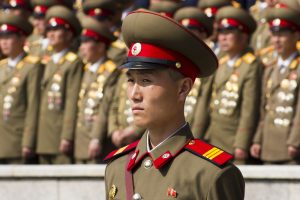Otto Warmbier, the 21-year old American college student detained by North Korea in early January, was sentenced Wednesday to 15 years of hard labor after being convicted of subversion. Warmbier, a third-year student at the University of Virginia (UVA), was in North Korea over the New Year’s holiday with a tour group. He was detained at the airport before leaving the country, with the North Korean authorities accusing him of a “hostile act” against the state with “the tacit connivance of the U.S. government and under its manipulation.” Also implicated were an Ohio Methodist church and a semi-secret philanthropic society at UVA.
Warmbier’s trial before the North Korean Supreme Court lasted one hour and came just over two weeks after the release of a video of him allegedly confessing. In words most likely written by a North Korean government official (they certainly don’t sound authentic to native English speakers), he confessed to stealing a propaganda banner.
“On the early morning of January 1, 2016 I committed my crime of taking out the important political slogan from the staff-only area of the Yanggakdo International Hotel. Aimed at harming the work ethic and the motivation of the Korean people,” he said. Warmbier then went on to praise the North Korean government, “I have been very impressed with the Korean government’s humanitarian treatment of severe criminals like myself and of their very fair and square legal procedures.”
As reported by the Associated Press, Warmbier said he was stealing the banner to give to a friend to hang in her church:
In a tearful statement made before his trial, Warmbier told a gathering of reporters in Pyongyang he was offered a used car worth $10,000 if he could get a propaganda banner and was also told that if he was detained and didn’t return, $200,000 would be paid to his mother in the form of a charitable donation.
He also reportedly said UVA’s Z Society encouraged him in the act.
Warmbier’s family, as well as UVA, have remained relatively quiet about the case. The UVA student newspaper, The Cavalier Daily, reported that Anthony de Bruyn, a university spokesman, issued a statement via email saying, “The University is aware of the recent media reports regarding Otto Warmbier and remains in touch with his family.” The tour company Warmbier entered the North Korea with, Young Pioneer Tours, issued a statement saying that the sentencing “should be viewed in similar context of previous cases of Americans being sentenced in the DPRK…We are continuing to work closely with relevant authorities to ensure a speedy and satisfactory outcome for Mr. Warmbier.”
The constellation of conspiracy theories noted above make Warmbier’s a text-book case: an authoritarian regime pegging a foreigner with a crime of undermining national unity and making a big show of it. North Korea often accuses the United States and South Korea of sending spies into the north in the guise of tourists or humanitarian workers. Others who have been detained by Pyongyang for similar crimes were released after high-profile visits: in 2009 former U.S. President Bill Clinton traveled to North Korea and came back with two jailed journalists, Euna Lee and Laura Ling. In 2014, James Clapper, the Director of National Intelligence, visited Pyongyang and came back with Matthew Miller and Kenneth Bae. Bae, Miller, Lee, and Ling had all been sentenced to hard labor, from 6 to 15 years.
With current heightened tensions between North Korea and the outside world–stemming from a January nuclear test, February satellite launch, new sanctions, and recent threats of a missile test–it’s uncertain what will happen next in Warmbier’s case. Surely the United States is working toward securing his release, but how soon that can be achieved given the current state of affairs is an open question.
































